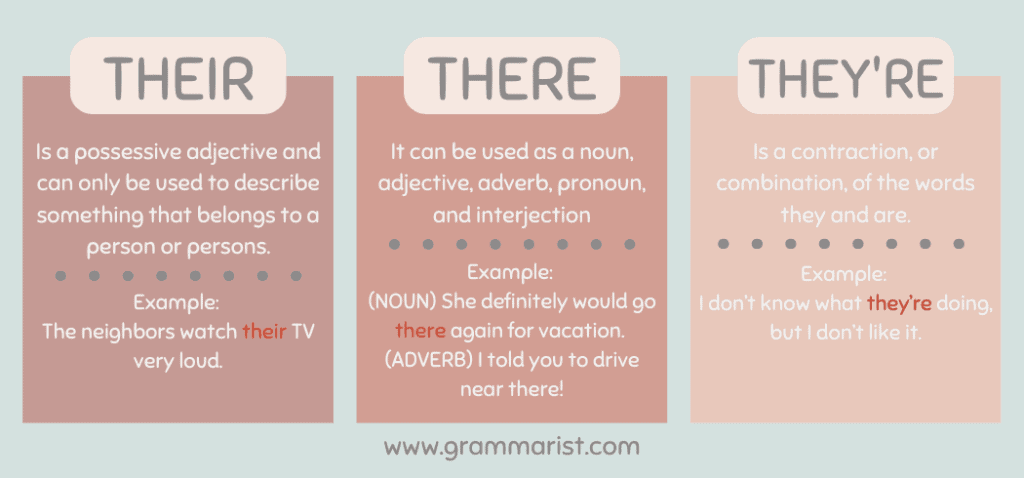The English language contains many similar sounding words that confuse Native English speakers and English language learners alike.
Homophones, words that sound the same, but are spelled differently, are particularly confusing. There, their, and they’re are one of the most frustrating examples of this. Learning the differences between these three words can mean the difference between communicating effectively and making your audience extremely frustrated.
Read on to understand how to define each of these words and how to use them correctly in your writing.
What is the Difference Between There, Their, and They’re?

There, their, and they’re are common words we use in our everyday language. Despite their exact pronunciations, they do mean different things, and knowing the proper way to use them can mean the difference between being taken seriously as a writer or being ignored due to serious grammar mistakes.
The first step to determining what each means is understanding which parts of speech they represent.
- “There” is the most diverse of the group. It can be used as a noun, adjective, adverb, pronoun, and interjection. We will explore all of these uses below with examples.
- “Their” is a possessive adjective and can only be used to describe something that belongs to a person or persons.
- “They’re” is a contraction, or combination, of the words they and are.
What Does There Mean?
There can function in several ways. Understanding its use helps you place it where it belongs to make your writing clear and concise.
As a Noun
There is most commonly used as a noun to refer to a particular place.
For example:
- She definitely would go there again for vacation.
- We are driving to Chicago tomorrow since the marathon starts there.
As an Adverb
There is used as an adverb in reference to mean at, in, or toward that place.
For example:
- The child was begging to go over there.
- She waved towards the building, exclaiming, “You can park in there.”
- I told you to drive near there!
As an Adjective
There can modify a noun or pronoun to emphasize or indicate that something is at a certain place.
For example:
- The teacher is there for you to answer questions whenever you need her.
- I’ll be there for you through thick and thin.
As a Pronoun
Use there as a singular pronoun to introduce a noun, phrase, clause, or sentence.
For example:
- There will be a lot of confusion during the first week of school.
- Are there any parking spots left?
- Is there a way I can get some help with this?
As an Interjection
There can also be used as an interjection to express relief, satisfaction, or sympathy. In this sense the word is used to evoke an emotion or express sympathy.
For example:
- “There, there. Things will all work out,” she exclaimed while patting his back.
Examples of There in a Sentence
Steve Carlton also pitched there. [ESPN]
There is plenty of optimism in Baltimore right now. [Baltimore Sun]
There will be a lot of fuss about such principles and practices, but it won’t hold. [Guardian]
His passion for the people there is so strong he’s adopted two children from the island nation. [USA Today]
And the lame-brained lies build from there. [ABC News]
What Does Their Mean?
As mentioned above, their functions as an adjective and is the possessive of them. A possessive adjective describes ownership of something, often by more than one person. A noun will almost always follow the word “their.”
For example:
- The neighbors watch their TV very loud.
- Cats get grouchy without their dinner.
- Most wives love their husbands.
Examples of Their in a Sentence
During the dry season, they use their tusks to dig up dry riverbeds and create watering holes many animals can drink from. [National Geographic]
Amateur to expert gardeners all want the best for their plants so they can grow to be strong and healthy. [Albuquerque Journal]
Looking for a place to order takeout tonight? We asked readers what their favorite restaurants are, plus added a few of our own. [Boston Globe]
What Does They’re Mean?
A contraction is a word formed by combining two words. They’re is a combination of the words they and are and is used in place of the phrase “they are “in writing. it is commonly used in informal speech and writing.
For example:
- They’re coming over at six.
- I don’t know what they’re doing, but I don’t like it.
- They think they’re so special.
Examples of They’re in a Sentence
The introductory blurb claims that completing a tutorial will take about an hour, but as the level they’re pitched at is fairly basic, anyone who has spent much time using the Web already will zip through the introductory tour in no time. [Science]
Discoveries such as Marble Canyon can appear to be luck, but that the scientists who make them always know what they’re looking for. [Natural History Museum]
“There’s a little granary there,” he says, peering through his binoculars. “They’re all over the place up here. You have to risk your life to get into them.” [Smithsonian]
There, Their, and They’re Quick Review
Homophones sound the same, despite their spelling differences, which can lead to the common mistake of using the wrong option when deciding which is correct. And, the English language is full of them. To, too, and two; your and you’re; and their, there, and they’re confuse many a Native English speaker.
To help keep them straight, first, remember the parts of speech associated with them.
- There is commonly used and has many variations (noun, pronoun, adverb, adjective, and interjection.
- Their is a possessive adjective. It means something belongs to them.
- They’re is a conjunction of the words they and are.
